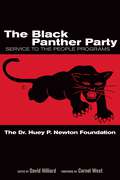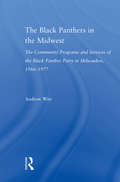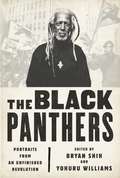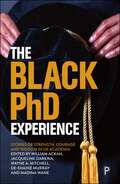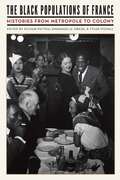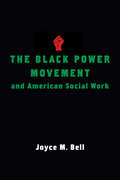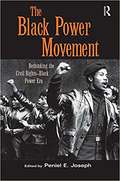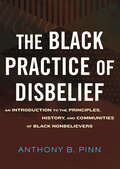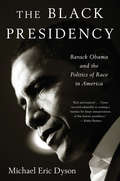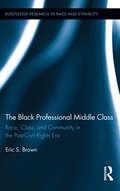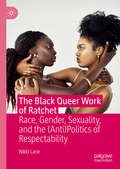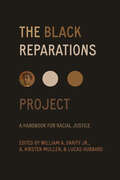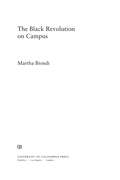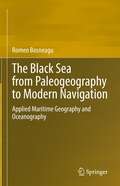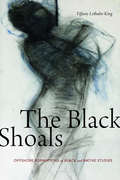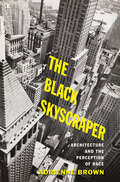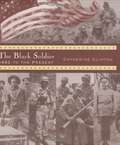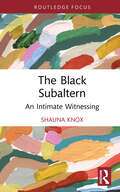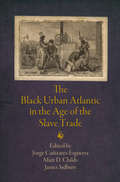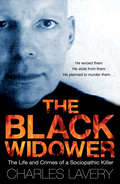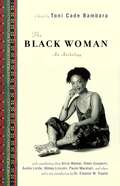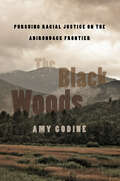- Table View
- List View
The Black Panther Party: Service to the People Programs
by David HilliardThe Black Panther Party represents Black Panther Party members' coordinated responses over the last four decades to the failure of city, state, and federal bureaucrats to address the basic needs of their respective communities. The Party pioneered free social service programs that are now in the mainstream of American life. The Party's Sickle Cell Anemia Research Foundation, operated with Oakland's Children's Hospital, was among the nation's first such testing programs. Its Free Breakfast Program served as a model for national programs. Other initiatives included free clinics, grocery giveaways, school and education programs, senior programs, and legal aid programs. Published here for the first time in book form, The Black Panther Party makes the case that the programs' methods are viable models for addressing the persistent, basic social injustices and economic problems of today's American cities and suburbs.
The Black Panthers in the Midwest: The Community Programs and Services of the Black Panther Party in Milwaukee, 1966–1977 (Studies in African American History and Culture)
by Andrew WittThis book analyzes the community programs of the Black Panther Party, specifically those of the Milwaukee branch, with the aim of dispelling many of the existing stereotypes about the Party. Misconceptions range from the Party being labeled as bent on the violent destruction of the United States to it being an overwhelmingly sexist group. This book challenges stereotypes such as these by examining the community programs of the Party and by looking at the role of women in the Party. Witt argues that the Party was not an extremist group dedicated to overthrowing the government of the United States, but rather an organization committed to providing essential community services for lower-income and working-class African American communities around the nation.
The Black Panthers: Portraits from an Unfinished Revolution (E-duke Books Scholarly Collection)
by Peniel E. Joseph Yohuru Williams Bryan Shih"Brilliant, painful, enlightening, tearful, tragic, sad, and funny, this photo-essay book is at its core about healing, and about the social justice work that still needs to be done in the era of hip-hop, Black Lives Matter, and the historic presidency of Barack Obama.” -Kevin Powell, author of The Education of Kevin Powell: A Boy's Journey into Manhood"A brilliantly conceived volume. Bryan Shih and Yohuru Williams demonstrate why the Panthers' story-its lessons and failures-even fifty years after its founding remains key to understanding national and international struggles for freedom and justice today.” -Cheryl Finley, professor and director of visual studies, Cornell UniversityEven fifty years after it was founded, the Black Panther Party remains one of the most misunderstood political organizations of the twentieth century. But beyond the labels of "extremist” and "violent” that have marked the party, and beyond charismatic leaders like Huey Newton, Bobby Seale, and Eldridge Cleaver, were the ordinary men and women who made up the Panther rank and file.In The Black Panthers, photojournalist Bryan Shih and historian Yohuru Williams offer a reappraisal of the party's history and legacy. Through stunning portraits and interviews with surviving Panthers, as well as illuminating essays by leading scholars, The Black Panthers reveals party members' grit and battle scars-and the undying love for the people that kept them going.
The Black PhD Experience: Stories of Strength, Courage and Wisdom in UK Academia
by William Ackah, Jacqueline Darkwa, Wayne A. Mitchell, De-Shaine Murray and Madina WaneThis unique book charts the journeys of Black doctoral students through UK higher education. Using powerful firsthand accounts, the book details the experiences of Black PhD students. From application through to graduation and beyond, the book offers key insights into the workings of higher education, highlighting the structural barriers that impede progress. Challenges and recommendations are issued for the sector and wider community. This text is a witness to the tenacity and brilliance of Black students to achieve against the odds. A game changer for the sector. Essential reading for anyone interested in equity and inclusion in higher education.
The Black Populations of France: Histories from Metropole to Colony
by Tyler Stovall Sylvain Pattieu Emmanuelle SibeudThe Black Populations of France is a study of Black peoples and their history in France and the French Empire during the modern era, from the eighteenth century to the present. The contributors to this collection explore three main axes. The first addresses circulations—the ways Black populations have moved through the spaces of metropolitan France and the empire—and focuses on the actors themselves and the margins of maneuver available to them, particularly as soldiers, sailors, immigrants, or political militants. The second considers legacies and the ways the past has informed the present, addressing themes such as the memory of slavery, the histories of Black women and gender, and the historical influence of African Americans on Blacks in France. The final axis considers racial policy and the ways the state has shaped racial discourses through the interactions between state policies and ideas of race developed by individuals, organizations, and communities. The Black Populations of France makes an important contribution to both modern French history and the history of the global Black diaspora. By putting these histories in dialogue with each other, it underscores the central place of France in world history.
The Black Power Movement and American Social Work
by Joyce BellThe Black Power movement has often been portrayed in history and popular culture as the quintessential "bad boy" of modern black movement-making in America. Yet this impression misses the full extent of Black Power's contributions to U.S. society, especially in regard to black professionals in social work. Relying on extensive archival research and oral history interviews, Joyce M. Bell follows two groups of black social workers in the 1960s and 1970s as they mobilized Black Power ideas, strategies, and tactics to change their national professional associations. Comparing black dissenters within the National Federation of Settlements (NFS), who fought for concessions from within their organization, and those within the National Conference on Social Welfare (NCSW), who ultimately adopted a separatist strategy, she shows how the Black Power influence was central to the creation and rise of black professional associations. She also provides a nuanced approach to studying race-based movements and offers a framework for understanding the role of social movements in shaping the non-state organizations of civil society.
The Black Power Movement and American Social Work
by Joyce M. BellThe Black Power movement has often been portrayed in history and popular culture as the quintessential "bad boy" of modern black movement making in America. Yet this image misses the full extent of Black Power's contributions to U.S. society, especially in regard to black professionals in social work.Relying on extensive archival research and oral history interviews, this study follows two groups of black social workers in the 1960s and 1970s as they mobilized Black Power ideas, strategies, and tactics to change their national professional associations. Comparing black dissenters within the National Federation of Settlements (NFS), who fought for concessions from within their organization, and those within the National Conference on Social Work (NCSW), who ultimately adopted a separatist strategy, this book shows how the Black Power influence was central to the rise of black professional associations. It provides a nuanced approach to studying race-based movements and offers a framework for understanding the role of social movements in shaping the nonstate organizations of civil society.
The Black Power Movement: Rethinking the Civil Rights-Black Power Era
by Peniel E. JosephThe Black Power Movement remains an enigma. Often misunderstood and ill-defined, this radical movement is now beginning to receive sustained and serious scholarly attention. Peniel Joseph has collected the freshest and most impressive list of contributors around to write original essays on the Black Power Movement. Taken together they provide a critical and much needed historical overview of the Black Power era. Offering important examples of undocumented histories of black liberation, this volume offers both powerful and poignant examples of 'Black Power Studies' scholarship.
The Black Practice of Disbelief: An Introduction to the Principles, History, and Communities of Black Nonbelievers
by Anthony PinnA short introduction to Black Humanism: its history, its present, and the rich cultural sensibilities that infuse itIn the United States, to be a Black American is to be a Black Christian. And there&’s something to this assumption in that the vast majority of African Americans are Christian. However, in recent years a growing number of African Americans have said they claim no particular religious affiliation—they are Black "nones." And of these Black "nones," the most public and vocal are those who claim to be humanists.What does it mean to be a Black humanist? What do Black humanist believe, and what do they do? This slim volume answers these questions. Animated by six central principles, and discussed in terms of its history, practices, formations, and community rituals, this book argues that Black humanism can be understood as a religious movement. Pinn makes a distinction between theism and religion—which is simply a tool for examining, naming, and finding the meaning in human experience. Black humanism, based on this definition isn&’t theistic but it is a religious system used to explore human experience and foster life meaning. It infuses humanism with rich cultural sensibilities drawn from Black experience. As shown in these pages, thinking about Black humanism this way frees readers from making unfounded assumptions and enables them to better appreciate the secular &“beliefs,&” ritual structures, and community formation constituted by Black humanists.
The Black Presidency: Barack Obama and the Politics of Race in America
by Michael Eric DysonA provocative and lively examination of the meaning of America's first black presidency, by the New York Times-bestselling author of Tears We Cannot Stop. Michael Eric Dyson explores the powerful, surprising way the politics of race have shaped Barack Obama&’s identity and groundbreaking presidency. How has President Obama dealt publicly with race—as the national traumas of Tamir Rice, Trayvon Martin, Michael Brown, Eric Garner, Freddie Gray, and Walter Scott have played out during his tenure? What can we learn from Obama's major race speeches about his approach to racial conflict and the black criticism it provokes? Dyson explores whether Obama&’s use of his own biracialism as a radiant symbol has been driven by the president&’s desire to avoid a painful moral reckoning on race. And he sheds light on identity issues within the black power structure, telling the fascinating story of how Obama has spurned traditional black power brokers, significantly reducing their leverage. President Obama&’s own voice—from an Oval Office interview granted to Dyson for this book—along with those of Eric Holder, Al Sharpton, Jesse Jackson, Andrew Young, and Maxine Waters, among others, add unique depth to this profound tour of the nation&’s first black presidency. &“Dyson proves…that he is without peer when it comes to contextualizing race in twenty-first-century America… A must-read for anyone who wants to better understand America&’s racial past, present, and future.&”—Gilbert King, author of the Pulitzer Prize–winning Devil in the Grove&“No one understands the American dilemma of race—and Barack Obama&’s confounding and yet wondrous grappling with it—better than [Dyson.]&”—Douglas Blackmon, author of the Pulitzer Prize–winning Slavery by Another Name
The Black Professional Middle Class: Race, Class, and Community in the Post-Civil Rights Era (Routledge Research in Race and Ethnicity #8)
by Eric S. BrownThrough an in-depth case study of the black professional middle class in Oakland, this book provides an analysis of the experiences of black professionals in the workplace, community, and local politics. Brown shows how overlapping dynamics of class formation and racial formation have produced historically powerful processes of what he terms "racialized class formation," resulting in a distinct (and internally differentiated) entity, not merely a subset of a larger professional middle class.
The Black Queer Work of Ratchet: Race, Gender, Sexuality, and the (Anti)Politics of Respectability
by Nikki LaneThis book enters as a corrective to the tendency to trivialize and (mis)appropriate African American language practices. The word ratchet has entered into a wider (whiter) American discourse the same way that many words in African American English have—through hip-hop and social media. Generally, ratchet refers to behaviors and cultural expressions of Black people that sit outside of normative, middle-class respectable codes of conduct. Ratchet can function both as a tool for critiquing bad Black behavior, and as a tool for resisting the notion that there are such things as “good” and “bad” behavior in the first place. This book takes seriously the way ratchet operates in the everyday lives of middle-class and upwardly mobile Black Queer women in Washington, DC who, because of their sexuality, are situated outside of the norms of (Black) respectability. The book introduces the concept of “ratchet/boojie cultural politics” which draws from a rich body of Black intellectual traditions which interrogate the debates concerning what is and is not “acceptable” Black (middle-class) behavior. Placing issues of non-normative sexuality at the center of the conversation about notions of propriety within normative modes of Black middle-class behavior, this book discusses what it means for Black Queer women’s bodies to be present within ratchet/boojie cultural projects, asking what Black Queer women’s increasing visibility does for the everyday experiences of Black queer people more broadly.
The Black Reparations Project: A Handbook for Racial Justice
by William A. Darity Jr., A. Kirsten Mullen, and Lucas HubbardThis groundbreaking resource moves us from theory to action with a practical plan for reparations. A surge in interest in black reparations is taking place in America on a scale not seen since the Reconstruction Era. The Black Reparations Project gathers an accomplished interdisciplinary team of scholars—members of the Reparations Planning Committee—who have considered the issues pertinent to making reparations happen. This book will be an essential resource in the national conversation going forward. The first section of The Black Reparations Project crystallizes the rationale for reparations, cataloguing centuries of racial repression, discrimination, violence, mass incarceration, and the immense black-white wealth gap. Drawing on the contributors’ expertise in economics, history, law, public policy, public health, and education, the second section unfurls direct guidance for building and implementing a reparations program, including draft legislation that addresses how the program should be financed and how claimants can be identified and compensated. Rigorous and comprehensive, The Black Reparations Project will motivate, guide, and speed the final leg of the journey for justice.
The Black Reproductive: Unfree Labor and Insurgent Motherhood
by Sara Clarke KaplanHow Black women&’s reproduction became integral to white supremacy, capitalism, and heteropatriarchy—and remains key to their dismantling In the United States, slavery relied on the reproduction and other labors of unfree Black women. Nearly four centuries later, Black reproductivity remains a vital technology for the creation, negotiation, and transformation of sexualized and gendered racial categories. Yet even as Black reproduction has been deployed to resolve the conflicting demands of white supremacy, capitalism, and heteropatriarchy, Sara Clarke Kaplan argues that it also holds the potential to destabilize the oppressive systems it is supposed to maintain.The Black Reproductive convenes Black literary and cultural studies with feminist and queer theory to read twentieth- and twenty-first-century texts and images alongside their pre-emancipation counterparts. These provocative, unexpected couplings include how Toni Morrison&’s depiction of infanticide regenders Orlando Patterson&’s theory of social death, and how Mary Prince&’s eighteenth-century fugitive slave narrative is resignified through the representational paradoxes of Gayl Jones&’s blues novel Corregidora. Throughout, Kaplan offers new perspectives on Black motherhood and gendered labor, from debates over the relationship between President Thomas Jefferson and Sally Hemings, to the demise of racist icon Aunt Jemima, to discussions of Black reproductive freedom and abortion. The Black Reproductive gives vital insight into the historic and ongoing conditions of Black unfreedom, and points to the possibilities for a Black feminist practice of individual and collective freedom.
The Black Revolution on Campus
by Martha BiondiThe Black Revolution on Campus is the definitive account of an extraordinary but forgotten chapter of the black freedom struggle. In the late 1960s and early 1970s, Black students organized hundreds of protests that sparked a period of crackdown, negotiation, and reform that profoundly transformed college life. At stake was the very mission of higher education. Black students demanded that public universities serve their communities; that private universities rethink the mission of elite education; and that black colleges embrace self-determination and resist the threat of integration. Most crucially, black students demanded a role in the definition of scholarly knowledge. Martha Biondi masterfully combines impressive research with a wealth of interviews from participants to tell the story of how students turned the slogan "black power" into a social movement. Vividly demonstrating the critical linkage between the student movement and changes in university culture, Biondi illustrates how victories in establishing Black Studies ultimately produced important intellectual innovations that have had a lasting impact on academic research and university curricula over the past 40 years. This book makes a major contribution to the current debate on Ethnic Studies, access to higher education, and opportunity for all.
The Black Sea and the Early Civilizations of Europe, the Near East and Asia
by Mariya IvanovaThe Black Sea lies at the junction of three major cultural areas: Europe, Central Asia, and the Near East. It plays a crucial role in enduring discussions about the impact of complex Near Eastern societies on European societies, and the repercussions of early urbanization across Eurasia. This book presents the first comprehensive overview of the Black Sea region in the prehistoric period. It penetrates artificial boundaries imposed by traditions, politics, and language to encompass both the European and Asiatic coasts and both Eastern European and Western scholarly literature. With a critical compilation and synthesis of archaeological data, this study situates the prehistoric Black Sea in a global historical context. By adopting the perspective of technology and innovation, it transcends a purely descriptive account of material culture and emphasizes society, human interaction, and engagement with the material world.
The Black Sea from Paleogeography to Modern Navigation: Applied Maritime Geography and Oceanography
by Romeo BosneaguThis book provides an analysis of the evolution of navigation and seaborne trade in the Black Sea, considering the geographic, geological, and hydro-meteorological data, including information from the historical, geopolitical, economic, social, and military frames. In ancient times the Black Sea was at the edge of the known world, and together with its coasts it preserves traces of the Greek, Roman, and Byzantine civilizations. Many of the ancient ports were important and essential towns, which remains the case in modern times. The complex geographical conditions that have historically influenced, and continue to influence the development of maritime trade and transport in the Black Sea, have not been thoroughly researched or optimized for these activities. The book is divided into ten chapters. Chapter I describes the physical – geographical conditions of the Black Sea’s basin, and the geological evolution of its recent history, with application to the hypothesis of Noah's flood. Chapter 2 presents a short history of the research conducted on the Black Sea upto present day. Chapter 3 summarizes the specific characteristics of the Black Sea’s morphohydrography and morphodynamics. Chapter 4 contains the conclusions regarding the influence of coastal relief on the navigation and seaborne trade on the Black Sea. Chapter 5 analyzes the Black Sea basin’s meteo-climatic regime. Chapter 6 contains the conclusions of the influence of weather and climate factors on the navigation and seaborne trade on the Black Sea. Chapter 7 describes the specific hydrological factors of the Black Sea. Chapter 8 contains the conclusions regarding the influence of the hydrological factors for the navigation and seaborne trade on the Black Sea. Chapter 9 presents the Black Sea’s specific hydrobiological elements specific, as a „unicum hydrobiologicum”, and the main features of the Black Sea’s ecology. Chapter 10 is concentrated on the historical, social, political, economic, and geopolitical framework of the Black Sea basin influencing navigation and maritime transportation, from ancient times to the present. The book is written from the perspective of a Romanian Navy officer, with more than 40 years’ experience in the Romanian Navy
The Black Shoals: Offshore Formations of Black and Native Studies
by Tiffany Lethabo KingIn The Black Shoals Tiffany Lethabo King uses the shoal—an offshore geologic formation that is neither land nor sea—as metaphor, mode of critique, and methodology to theorize the encounter between Black studies and Native studies. King conceptualizes the shoal as a space where Black and Native literary traditions, politics, theory, critique, and art meet in productive, shifting, and contentious ways. These interactions, which often foreground Black and Native discourses of conquest and critiques of humanism, offer alternative insights into understanding how slavery, anti-Blackness, and Indigenous genocide structure white supremacy. Among texts and topics, King examines eighteenth-century British mappings of humanness, Nativeness, and Blackness; Black feminist depictions of Black and Native erotics; Black fungibility as a critique of discourses of labor exploitation; and Black art that rewrites conceptions of the human. In outlining the convergences and disjunctions between Black and Native thought and aesthetics, King identifies the potential to create new epistemologies, lines of critical inquiry, and creative practices.
The Black Skyscraper: Architecture and the Perception of Race
by Adrienne BrownHow did writers and artists view the intersection of architecture and race in the modernist era?Winner of the MSA First Book Prize of the Modernist Studies AssociationWith the development of the first skyscrapers in the 1880s, urban built environments could expand vertically as well as horizontally. Tall buildings emerged in growing cities to house and manage the large and racially diverse populations of migrants and immigrants flocking to their centers following Reconstruction. Beginning with Chicago's early 10-story towers and concluding with the 1931 erection of the 102-story Empire State Building, Adrienne Brown's The Black Skyscraper provides a detailed account of how scale and proximity shape our understanding of race.Over the next half-century, as city skylines grew, American writers imagined the new urban backdrop as an obstacle to racial differentiation. Examining works produced by writers, painters, architects, and laborers who grappled with the early skyscraper's outsized and disorienting dimensions, Brown explores this architecture's effects on how race was seen, read, and sensed at the turn of the twentieth century. In lesser-known works of apocalyptic science fiction, light romance, and Jazz Age melodrama, as well as in more canonical works by W. E. B. Du Bois, F. Scott Fitzgerald, Aaron Douglas, and Nella Larsen, the skyscraper mediates the process of seeing and being seen as a racialized subject. From its distancing apex—reducing bodies to specks—to the shadowy mega-blocks it formed at street level, the skyscraper called attention, Brown argues, to the malleable nature of perception. A highly interdisciplinary work, The Black Skyscraper reclaims the influence of race on modern architectural design as well as the less-well-understood effects these designs had on the experience and perception of race.
The Black Soldier: 1492 to the Present
by Catherine ClintonBlack soldiers have fought and died in the Americas for centuries, an unbroken chain of warriors stretching back nearly five hundred years. Yet their contribution to our nation's history has been neglected, and the battles they've had to fight against racism and prejudice have often been as challenging as facing the enemy on the field of battle. In this exciting story of African American heroism, Catherine Clinton traces the history of the black soldier, from the first African explorers who accompanied Columbus to African Americans who took up arms in the American Revolution and the Civil War, to those who served their country from the Montana frontier to the sands of Desert Storm. Their heroic tales show that while black soldiers were once systematically ignored in the armed forces, earning little praise and often dying for a nation that granted them few rights, with each successive opportunity to prove themselves in combat and in the ranks, black men and women have risen to the occasion and distinguished themselves. Ultimately it was the sacrifices of these valiant soldiers that led to today's fully integrated armed services.
The Black Subaltern: An Intimate Witnessing (Routledge Studies on African and Black Diaspora)
by Shauna KnoxIn The Black Subaltern, Shauna Knox revolts against the construct of the decontextualized self, electing instead to foreground the complex and problematic lived experience of the Black subaltern. Knox offers an account in which Black humanity is flattened, desubstantialized, and lost in a state of perpetual in-betweenness, which she coins subjective transmigration.Over the course of this book, Knox weaves autobiographical vignettes featuring her own journey as a Jamaican migrant to the United States together with theoretical reflection in order to elaborate on the conditions of Black subalternity. She considers the dissolution and disappearance of the subaltern authentic self to be a prerequisite for acquiring access to society. Knox reflects that Black migrants, though rooted in a new country, still remain integrally engaged with their country of origin, and as such, ultimately find themselves in a purgatory of in-betweenness, inhabiting nowhere in particular.This book’s innovative use of postformal autobiography to give voice to the Black subaltern provides students and researchers across the humanities, Black studies, diaspora studies, anthropology, sociology, geopolitics, development, and philosophy with rich material for reflection and discussion.
The Black Urban Atlantic in the Age of the Slave Trade
by Matt Childs Jorge Cañizares-Esguerra James SidburyDuring the era of the Atlantic slave trade, vibrant port cities became home to thousands of Africans in transit. Free and enslaved blacks alike crafted the necessary materials to support transoceanic commerce and labored as stevedores, carters, sex workers, and boarding-house keepers. Even though Africans continued to be exchanged as chattel, urban frontiers allowed a number of enslaved blacks to negotiate the right to hire out their own time, often greatly enhancing their autonomy within the Atlantic commercial system.In The Black Urban Atlantic in the Age of the Slave Trade, eleven original essays by leading scholars from the United States, Europe, and Latin America chronicle the black experience in Atlantic ports, providing a rich and diverse portrait of the ways in which Africans experienced urban life during the era of plantation slavery. Describing life in Portugal, Brazil, Mexico, the Caribbean, and Africa, this volume illuminates the historical identity, agency, and autonomy of the African experience as well as the crucial role Atlantic cities played in the formation of diasporic cultures. By shifting focus away from plantations, this volume poses new questions about the nature of slavery in the sixteenth to nineteenth centuries, illustrating early modern urban spaces as multiethnic sites of social connectivity, cultural incubation, and political negotiation.Contributors: Trevor Burnard, Mariza de Carvalho Soares, Matt D. Childs, Kevin Dawson, Roquinaldo Ferreira, David Geggus, Jane Landers, Robin Law, David Northrup, João José Reis, James H. Sweet, Nicole von Germeten.
The Black Widower: The Life and Crimes of a Sociopathic Killer
by Charles LaveryHe drugged his first wife and staged a fireball car crash, collecting a £200,000 insurance payout.He cheated his second wife of her life savings and attempted to kill her in a copycat crash.He faked cancer to dupe his third victim into a bigamous marriage, plotting her murder to steal her inheritance.He is Malcolm Webster: The Black Widower.After seventeen years of deception and brutality, Webster was finally jailed for thirty years in July 2011 at the climax of one of the longest trials in Scottish legal history. In this chilling book, award-winning journalist Charles Lavery documents the Black Widower’s life and crimes, giving a compelling insight into the mind of a man who killed for money and attempted to cover his tracks with drugs and fire.
The Black Woman: An Anthology
by Toni Cade Bambara Eleanor W TraylorA collection of early, emerging works from some of today's most celebrated African American female writers When it was first published in 1970, The Black Woman introduced readers to an astonishing new wave of voices that demanded to be heard. In this groundbreaking volume of original essays, poems, and stories, a chorus of outspoken women -- many who would become leaders in their fields: bestselling novelist Alice Walker, poets Audre Lorde and Nikki Giovanni, writer Paule Marshall, activist Grace Lee Boggs, and musician Abbey Lincoln among them -- tackled issues surrounding race and sex, body image, the economy, politics, labor, and much more. Their words still resonate with truth, relevance, and insight today.
The Black Woods: Pursuing Racial Justice on the Adirondack Frontier
by Amy GodineThe Black Woods chronicles the history of Black pioneers in New York's northern wilderness. From the late 1840s into the 1860s, they migrated to the Adirondacks to build farms and to vote. On their new-worked land, they could meet the $250 property requirement New York's constitution imposed on Black voters in 1821, and claim the rights of citizenship. Three thousand Black New Yorkers were gifted with 120,000 acres of Adirondack land by Gerrit Smith, an upstate abolitionist and heir to an immense land fortune. Smith's suffrage-seeking plan was endorsed by Frederick Douglass and most leading Black abolitionists. The antislavery reformer John Brown was such an advocate that in 1849 he moved his family to Timbuctoo, a new Black Adirondack settlement in the woods. Smith's plan was prescient, anticipating Black suffrage reform, affirmative action, environmental distributive justice, and community-based racial equity more than a century before these were points of public policy. But when the response to Smith's offer fell radically short of his high hopes, Smith's zeal cooled. Timbuctoo, Freemen's Home, Blacksville and other settlements were forgotten. History would marginalize this Black community for 150 years. In The Black Woods, Amy Godine recovers a robust history of Black pioneers who carved from the wilderness a future for their families and their civic rights. Her immersive story returns the Black pioneers and their descendants to their rightful place at the center of this history. With stirring accounts of racial justice, and no shortage of heroes, The Black Woods amplifies the unique significance of the Adirondacks in the American imagination.
